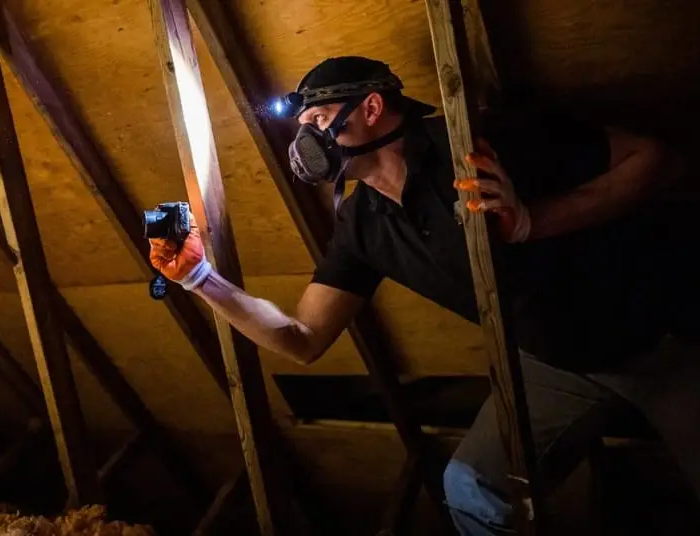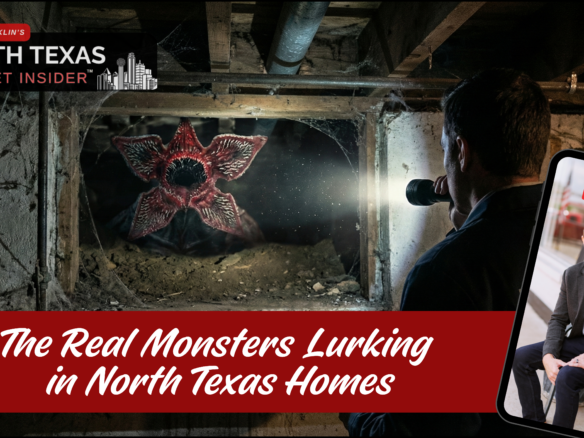“A $400 inspection can save you $40,000 in disaster. Choose wisely.”
Listen, here’s what nobody tells you about home inspections: The inspector you choose is either your guardian angel or your biggest blind spot.
I’ve watched buyers dodge $50,000 foundation nightmares because they hired the right inspector. I’ve also seen buyers inherit electrical disasters, hidden water damage, and HVAC systems on their last breath, all because they picked the cheapest inspector on Google or whoever their cousin recommended without asking any questions.
Here’s the reality: Approximately 86% of home inspections reveal issues requiring repair. The most common problems? Roofing (19.7%), electrical (18.7%), water heater (12.2%), and HVAC (9.9%). [1]
Your $400 inspection investment can save you an estimated $14,000 in unexpected repairs. But only if you choose the right inspector.
In North Texas, where expansive clay soil wreaks havoc on foundations and weather extremes stress every system, your inspector needs to be more than just “licensed.” They need to understand what’s normal settling and what’s a $50,000 structural problem.
This is your strategic playbook for choosing a home inspector who protects your investment.
What You’re Really Asking (And What You Should Be Asking)
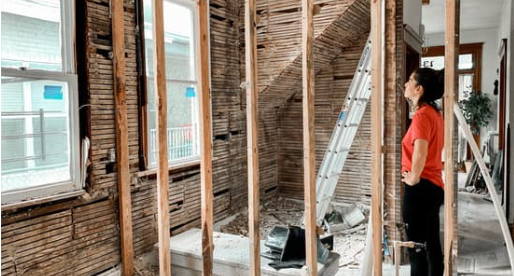
These are the questions people actually search:
- “How do I find a certified home inspector near me?”
- “What credentials should my inspector have?”
- “How much does a home inspection cost in Texas?”
- “Can my inspector help with foundation issues in North Texas?”
- “How long does a home inspection take?”
- “What does the report actually tell me?”
But here’s what you should really be asking: “How do I find an inspector who’ll catch the problems that’ll cost me tens of thousands if missed?”
That’s what this guide answers.
Texas Inspector Licensing: What Actually Matters
In Texas, home inspectors are licensed by the Texas Real Estate Commission (TREC). There are three levels, but only one matters for you:
Professional Real Estate Inspector (The Only Level You Should Hire)
This is the gold standard. Requirements:
- 194 hours of education (110 national + 84 Texas-specific)
- 40-hour hands-on practicum
- Pass both national and state exams
- 32 hours continuing education every two years
- Can work independently without supervision
- Authorized to render written opinions on foundation performance, critical in North Texas
The other two levels (Real Estate Inspector and Apprentice Inspector) work under supervision and have less training.
Your move: Only hire Professional Real Estate Inspectors. Period.
Verify their license: Go to TREC’s website and confirm their license is active. If they hesitate to give you their license number, walk away.
National Certifications That Actually Add Value
Beyond state licensing, look for these:
InterNACHI® (International Association of Certified Home Inspectors) [2]
- World’s largest inspector association
- Certified Professional Inspector (CPI®) credential
- Ongoing continuing education requirements
- Code of ethics and standards of practice
ASHI (American Society of Home Inspectors) [3]
- Established 1976, longest-running U.S. inspection association
- ASHI Certified Inspector (ACI) requires:
- Passing the National Home Inspector Exam
- Completing 250 fee-paid inspections
- Submitting five reports for review
- Following ASHI Standards of Practice and Code of Ethics
Why these matter: They show commitment to professionalism beyond minimum state requirements.
The Questions You Must Ask (Before You Hire)

Most buyers interview inspectors like they’re being polite. Wrong energy. Interview them like they’re applying to protect your biggest investment, because they are.
Experience and Credentials
“Are you a licensed Professional Real Estate Inspector with TREC?”
Not just “licensed”, Professional level. Get their license number and verify it.
“How long have you been inspecting, and how many inspections have you completed?”
Experience matters. Seasoned inspectors have seen everything and know what to look for.
“Are you InterNACHI or ASHI certified?”
National certification demonstrates ongoing education and professional standards.
“Do you have specific experience with North Texas homes and foundation issues related to expansive clay soil?”
This is critical. North Texas sits on expansive clay soil that swells when wet and shrinks when dry. This creates foundation movement, cracks, and structural stress.
An inspector unfamiliar with regional conditions might panic over normal settling or, worse, miss serious structural red flags. You need someone who knows the difference.
Insurance and Protection
“Do you carry Errors and Omissions (E&O) insurance, and can I see proof?”
Texas requires $100,000 minimum E&O coverage. This protects you if the inspector misses significant defects.
Here’s what most people don’t know: More than half of home inspectors face at least one insurance claim during their careers. Most involve missed water intrusion, foundation issues, mold, or defective systems. [4]
If they’re not insured, you’re the one holding the bag if something goes wrong.
“Are you bonded, and do you carry Workers’ Compensation?”
If an uninsured inspector or their assistant gets injured on the property, you could be liable.
Scope and Process
“What exactly does your inspection cover, and what doesn’t it include?”
Standard Texas inspections cover structure, roof, electrical, plumbing, HVAC, and appliances per TREC Standards of Practice.
What’s typically NOT included:
- Septic systems
- Pools and spas
- Termite/wood-destroying insects
- Mold testing
- Radon testing
- Sewer scopes
These are often specialty inspections, your agent should have the right contacts to deal with all of these issues.
Ask about additional services and costs upfront.
“Do you personally perform the entire inspection, or do you use subcontractors?”
The licensed inspector should conduct the inspection, not unlicensed assistants.
“Do you climb on the roof and enter attics and crawl spaces?”
Thorough inspectors physically access these areas unless safety concerns prevent it. Ask how they inspect inaccessible areas, drones and cameras are acceptable alternatives.
“Do you use thermal imaging or advanced technology?”
Thermal imaging detects moisture intrusion, insulation gaps, electrical hot spots, and HVAC inefficiencies. Not required, but many top inspectors include it at no extra cost.
“How long will the inspection take?”
A thorough inspection of a typical home takes 2-4 hours depending on size and condition. If someone’s quoting under an hour, they’re cutting corners.
“Can I attend the inspection?”
Reputable inspectors welcome and encourage your presence. Walking through with them lets you see issues firsthand and ask questions.
Red flag alert: If an inspector doesn’t want you present, run. They’re either hiding something or lack confidence.
“When will I receive the report, and what format?”
Professional inspectors provide detailed reports within 1-2 business days (often same-day).
Reports should include:
- Visual photos documenting every issue
- Clear descriptions organized by system (structural, electrical, plumbing, etc.)
- Summary section rating issues by severity (safety concerns, immediate repairs, maintenance items)
- Easy-to-navigate digital format (HTML and PDF)
- Actionable next steps
Ethics and Conflicts of Interest
“Do you perform repairs or have financial relationships with contractors?”
Under federal RESPA (Real Estate Settlement Procedures Act), it’s illegal for inspectors to receive kickbacks or referral fees in exchange for referring clients to contractors.
An unbiased inspector provides honest assessments without financial incentive to exaggerate or downplay issues.
If an inspector offers to fix what they find, that’s a massive conflict of interest. Walk away. [5]
“How much do you charge, and what does that include?”
Texas home inspection costs typically range from $340-$500 for standard single-family homes.
Dallas-Fort Worth area rates:
- Up to 1,000 sq ft: $420
- 1,500 sq ft: $435
- 2,000 sq ft: $465
- 2,500 sq ft: $500
- 3,000 sq ft: $540
- 4,000+ sq ft: $655+
Be cautious of inspectors charging significantly less than market rates, you get what you pay for. Higher prices don’t automatically mean better service, but suspiciously cheap inspections usually mean corners being cut.
Red Flags That Should Make You Run

Major Warning Signs:
Rushing through the inspection: If they complete a 2,000+ sq ft home in under 90 minutes, they’re missing things.
No ladder or equipment: Professional inspectors arrive with ladders, moisture meters, electrical testers, gas detectors, thermal cameras, and comprehensive tools.
Doesn’t want you present: Massive red flag. Good inspectors welcome your attendance.
Vague or generic reports: Reports should be detailed, photo-heavy, and specific to your property, not template checklists.
Conflicts of interest: Offers to perform repairs, has contractor partnerships, or pressures you to use specific service providers.
No insurance or licensing: Always verify active TREC license and adequate E&O coverage.
Can’t answer your questions clearly: If they’re evasive or can’t explain findings in plain English, they either don’t know or don’t want you to know.
Understanding Your Inspection Report
A comprehensive Texas inspection report follows TREC Standards of Practice and includes:
Header Information:
- Inspector credentials and TREC license number
- Inspection date, property address, weather conditions
- Key to symbols and severity ratings
Detailed Findings by System:
- Structural: Foundation, framing, grading, drainage
- Exterior: Siding, walkways, driveways, porches
- Roofing: Shingles, flashing, skylights, ventilation
- Plumbing: Pipes, drains, water heater, fixtures
- Electrical: Service panel, wiring, outlets, GFCI protection
- HVAC: Heating/cooling equipment, ductwork
- Interior: Walls, ceilings, floors, windows, doors
- Appliances: Condition and functionality
Annotated Photos:
Clear images documenting every issue.
Summary Section:
Prioritized findings organized by severity:
- Safety Concerns: Immediate attention required (faulty wiring, gas leaks, structural instability)
- Defects: Non-functioning systems requiring professional repair
- General Repairs: Minor issues and routine maintenance
Common North Texas Inspection Issues (What to Expect)
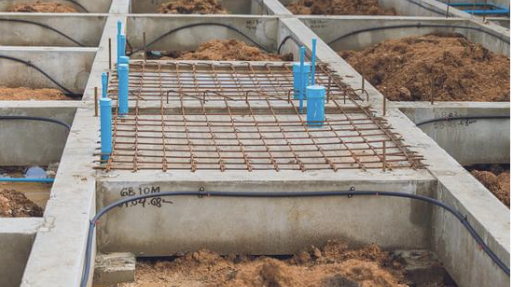
Foundation and Structural Issues (The Big One)
Due to expansive clay soil throughout DFW, foundation movement is extremely common.
Warning signs:
- Cracks in walls, ceilings, brick mortar, or exterior walls
- Doors and windows that stick or don’t close properly
- Uneven or sloping floors
- Gaps between walls and ceilings
- Nail pops
Critical point: Not every crack means disaster. Experienced North Texas inspectors know the difference between normal settling and red-flag foundation issues requiring structural engineering evaluation.
Roofing Problems (19.7% of Inspections)
- Missing or damaged shingles
- Improper installation or flashing
- Inadequate ventilation
- Visible leaks or water damage
Electrical Issues (18.7% of Inspections)
- Outdated or damaged wiring
- Reversed polarity
- Missing GFCI protection
- Overloaded circuits
- Federal Pacific or other recalled panels
Plumbing Concerns (14% of Inspections)
- Leaking or corroded pipes
- Low water pressure
- Aging water heaters
- Improper drainage
HVAC Problems
- Dirty or clogged filters
- Aging or inefficient systems
- Improper installation
When to Schedule Your Inspection (Timeline Strategy)
Step 1: Schedule Immediately After Offer Acceptance
Once the seller accepts your offer, schedule your inspection within 1-2 days. Inspection contingency periods typically last 7-10 days in Texas, timing is critical.
Step 2: Inspection Day (2-4 Hours)
Attend the inspection. Walk through with your inspector. Ask questions. Take notes.
Step 3: Review the Report (1-2 Days After)
Review the detailed report with your real estate agent. Discuss which findings warrant negotiation.
Step 4: Inspection Objection Period
Submit repair requests or negotiate before your contingency deadline.
Options:
- Request seller repairs
- Ask for seller concessions/credits
- Negotiate reduced purchase price
- Walk away if issues are too severe
Pro tip: Leave extra time for follow-up inspections by specialists (roofers, structural engineers, HVAC technicians, foundation experts) if needed.
Federal Regulations and Ethical Compliance (Why This Matters)
Fair Housing Act
The Fair Housing Act prohibits discrimination based on race, color, religion, sex, familial status, national origin, or disability. Real estate professionals must never steer clients toward or away from properties based on protected characteristics.
RESPA (Real Estate Settlement Procedures Act)
RESPA prohibits kickbacks and referral fees among settlement service providers, including home inspectors.
Violations result in:
- Civil liability equal to three times the charge
- Fines up to $10,000
- Imprisonment up to one year
- License suspension or revocation
When I refer clients to home inspectors, those relationships are based on performance and client protection, not financial arrangements.
The Inspectors I Trust: From Experience
These are the inspectors that I have personally worked with. Of the dozens of inspectors I’ve worked with through the years, these are the only two I am willing to hang my reputation on. (just click on the image to visit their websites)
MI6 Home Inspections: Graham Hunter

Ellis County Home Inspections: Andy Hinz
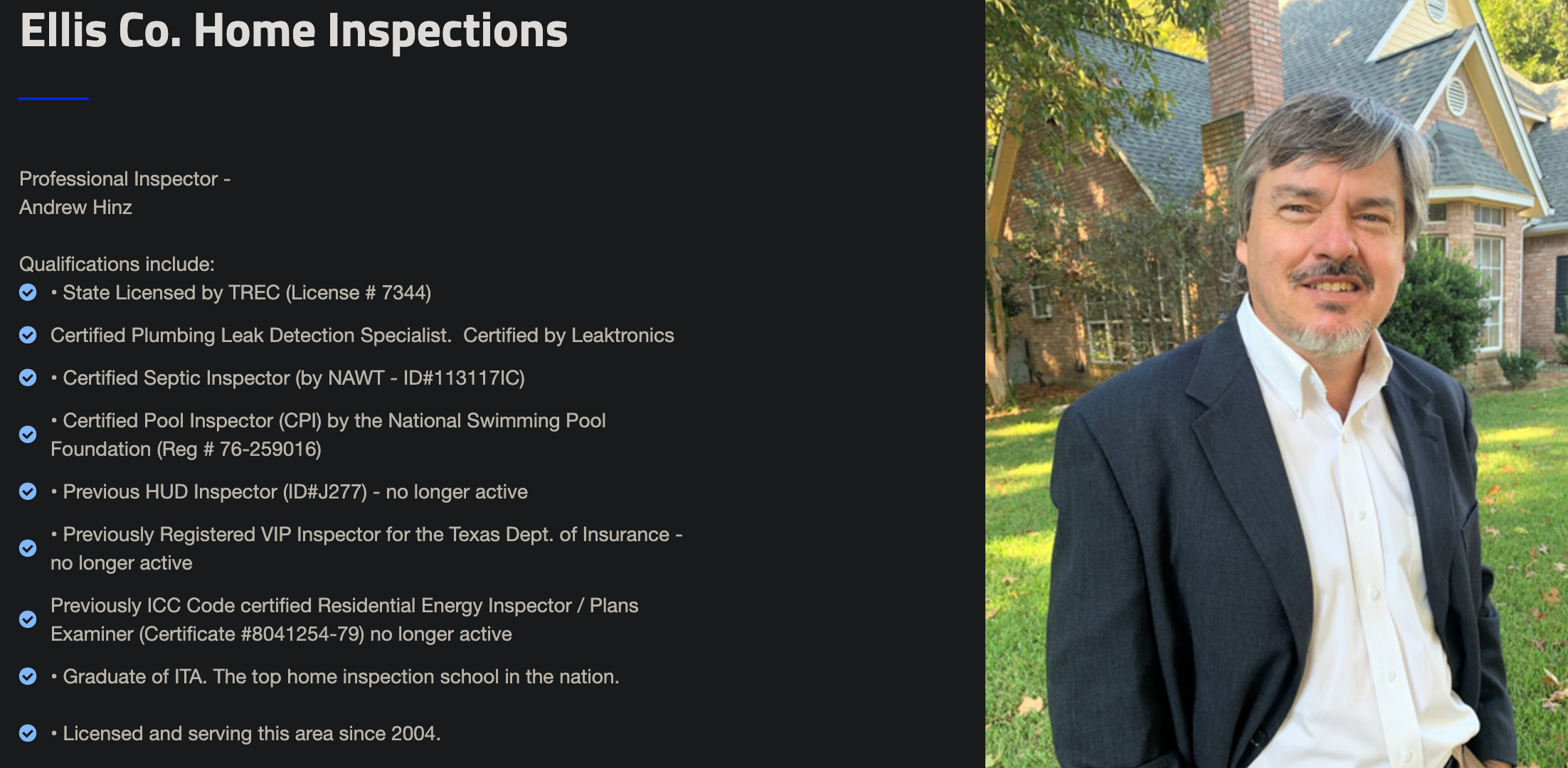
NAR Code of Ethics
As a REALTOR® member, I adhere to the NAR Code of Ethics, including duties of honesty, integrity, and competent service.
Providing accurate information about home inspectors and their findings is a fundamental ethical obligation.
The Bottom Line (Franklin Style)
Here’s what this comes down to:
Most buyers treat the home inspection like a checkbox. They hire whoever their agent suggests or whoever’s cheapest on Google. They don’t attend. They skim the report. They negotiate repairs halfheartedly.
Then they close. And six months later, they’re staring at a $25,000 foundation repair bill.
You now have the information to be different.
You understand what credentials matter. You know the questions to ask. You can spot red flags. You recognize that in North Texas, inspector experience with expansive clay soil is non-negotiable.
This is your move.
A thorough inspection by a qualified professional is one of the best investments you’ll make in your real estate transaction. It’s your opportunity to understand exactly what you’re buying, the good, the bad, and the expensive.
In North Texas, where soil conditions create unique challenges, working with an inspector who understands regional issues is particularly valuable.
Whether you’re buying your dream home in Waxahachie, selling a property in Ellis County, or investing in the greater DFW area, a thorough inspection provides peace of mind and informed decision-making power.
Choose like your investment depends on it. Because it does.
Ready to make your move? I’ll guide you through every step of the home buying and selling process, including connecting you with qualified, licensed home inspectors who meet the highest professional standards.
This is not checkers. Let’s protect your investment.
Disclaimer: This guide is for educational purposes and reflects current Texas Real Estate Commission regulations, federal housing laws, and industry best practices. For specific legal or financial advice, consult licensed professionals in those fields. I’m a licensed real estate professional in Texas providing educational information, not legal or financial advice through this article.


